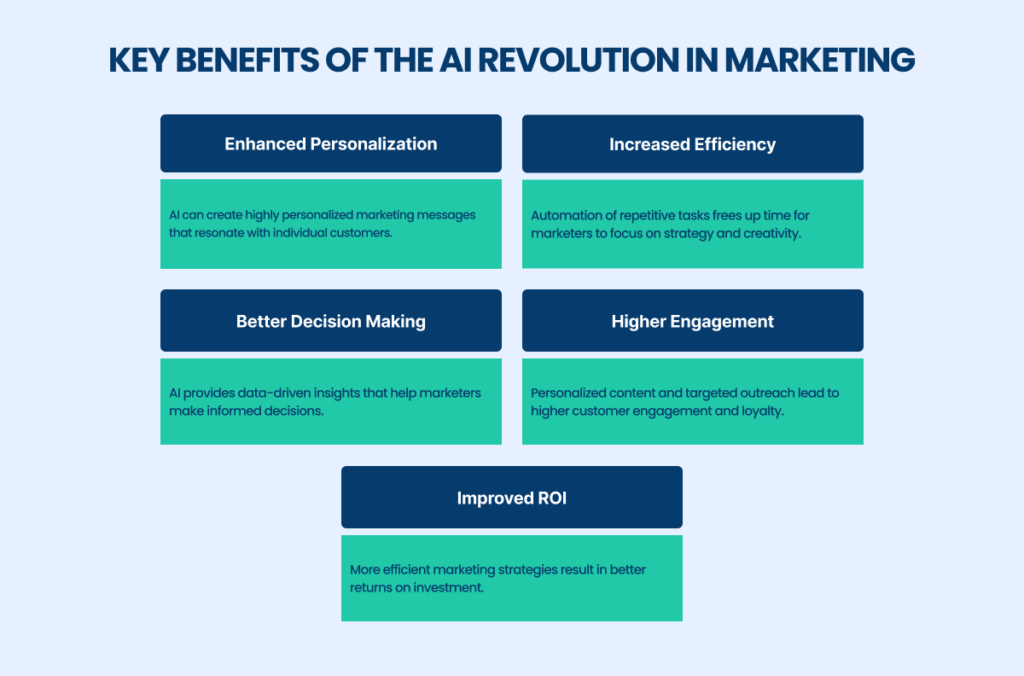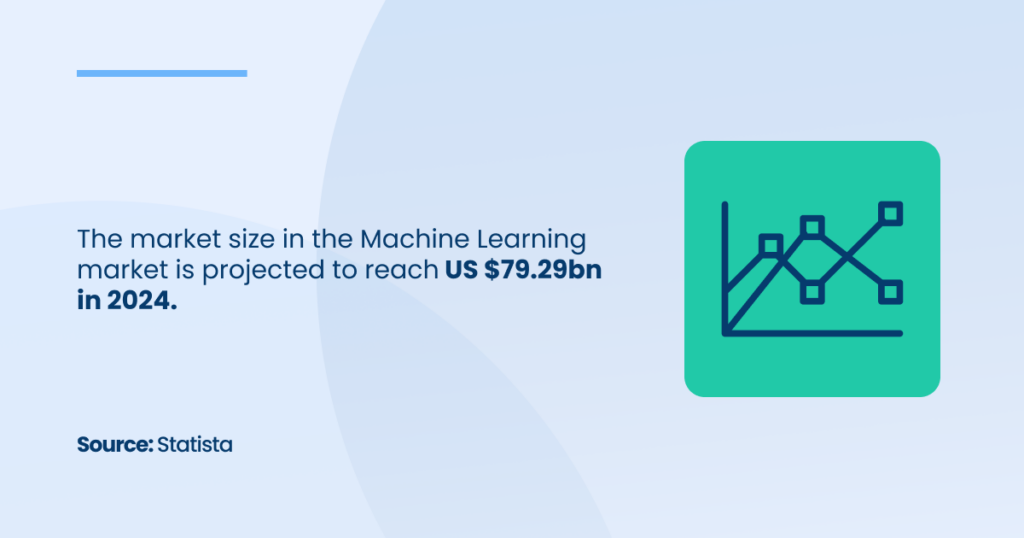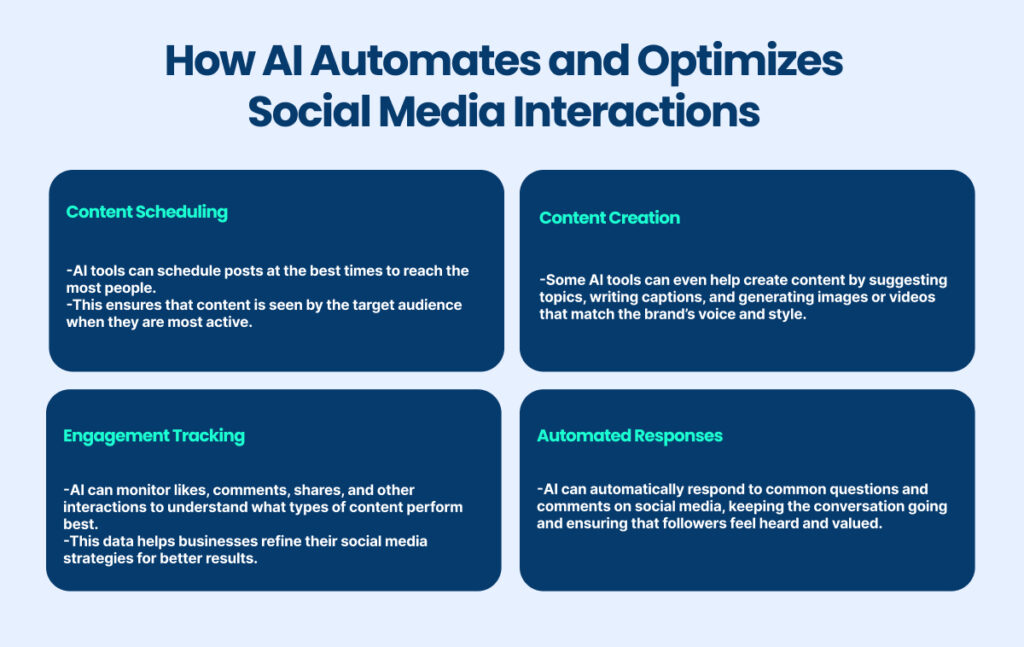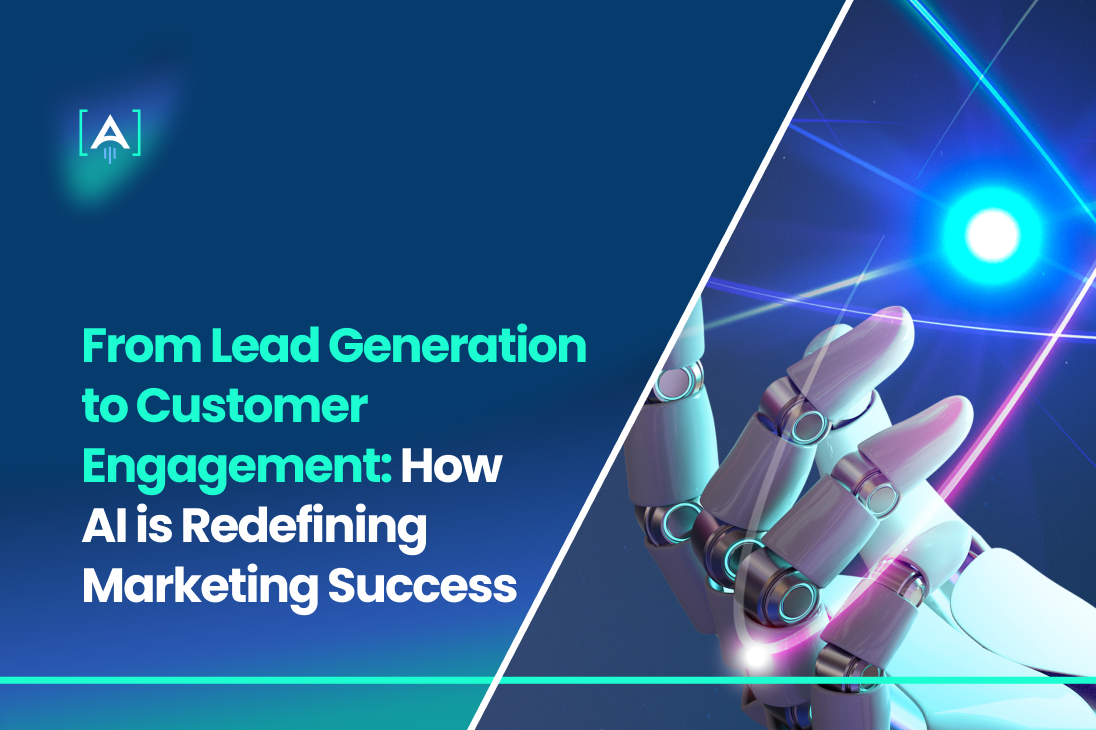The days of traditional marketing campaigns are over.
Artificial Intelligence is leading in a new era where personalized experiences and targeted outreach are the norm.
With AI, businesses can now understand their customers better than ever before. Accordingly, this transformation not only enhances customer satisfaction but also drives higher engagement and sales.
The global artificial intelligence market size was estimated at USD 196.63 billion in 2023.
Source: Grand View Research
It is projected to grow at a CAGR of 36.6% from 2024 to 2030.
The rise of AI is shaping the future of the digital age.
Tech titans like Amazon, Google, Apple, Facebook, IBM, and Microsoft are investing money in AI research, fueling a booming market for this revolutionary technology.
The blog post will cover how AI is used to identify and qualify potential leads and highlight the benefits of AI-driven lead generation and customer engagement.
The AI Revolution in Marketing
Artificial Intelligence (AI) is transforming the way businesses approach marketing.
Gone are the days when marketing was based solely on intuition and broad demographics.
Today, AI for marketing allows companies to create more personalized and effective campaigns by leveraging vast amounts of data and advanced technologies.
Statista notes that the largest market size is in the United States, with US$50.16 billion in 2024.
Source: Top 5 countries using AI, Statista
One of the key areas where AI is making a significant impact is in handling customer data.
Every day, businesses collect large amounts of information about their customers, including their preferences, behaviors, and purchasing history.
AI in marketing uses this data to gain deeper insights into customer needs and trends.
Key Benefits of the AI Revolution in Marketing

AI-Driven Lead Generation
In the world of marketing, finding the right leads is crucial for business growth. AI for marketing is changing how companies identify and attract potential customers.
By using advanced technologies, businesses can now find high-quality leads more efficiently than ever before.
Harnessing Predictive Analytics for Targeted Leads
Predictive analytics is a powerful tool in AI marketing that helps businesses find the best leads. Imagine having a crystal ball that shows which customers are most likely to buy your product.
AI uses machine learning to analyze customer data and spot patterns and trends. This means businesses can focus their efforts on people who are more likely to become customers, saving time and resources.

For example, an online store can use AI to look at past purchases and browsing behavior. The AI marketing tool can then predict which visitors are most likely to purchase in the future. This targeted approach ensures that marketing strategies are more effective, leading to better AI ROI.
Automating Outreach with Intelligent Systems
Reaching out to potential customers can be time-consuming, but AI-powered tools make it much easier.
Automating outreach with intelligent systems means that businesses can send personalized messages to leads without manually handling each one.
AI in marketing can manage email campaigns, social media posts, and even follow-up messages, ensuring that each lead receives timely and relevant communication.
Source: Technologies used within AI, Statista
For instance, an AI marketing tool can send a welcome email to a new subscriber, followed by messages guiding them through the sales funnel.
These messages can be customized based on the lead’s behavior and preferences, making the communication feel more personal.
This automation not only saves time but also ensures that no lead is forgotten.
Personalization at Scale
Personalization is no longer a luxury. It’s a necessity in today’s competitive market.
AI in marketing makes it possible to deliver personalized experiences to a large audience, something that would be impossible to achieve manually.
Dynamic Content Creation Using AI
Creating personalized content for each customer can be a daunting task, but AI makes it simple. AI content marketing tools can generate content that matches the unique preferences of each user.
Whether it’s blog posts, social media updates, or email newsletters, AI can produce content that feels personal and relevant to each recipient.
For example, an AI marketing tool can analyze a customer’s past interactions with a brand and create content that addresses their specific interests and needs.
This dynamic content creation ensures that customers receive information that is most relevant to them, increasing engagement and satisfaction.
Behavioral Targeting through Data Insights
Understanding how customers behave is key to delivering the right message at the right time.
AI in marketing uses data insights to analyze user behavior, such as browsing habits, purchase history, and interaction patterns. This information allows businesses to target their marketing messages more precisely.
For instance, if a customer frequently visits a website’s product pages but hasn’t purchased, AI can identify this behavior and trigger a targeted offer or reminder.
By delivering relevant messages based on actual behavior, businesses can increase the likelihood of conversion.
AI marketing analytics provide the data to understand customer actions, enabling more effective behavioral targeting.
AI-Powered Tools for Enhanced Marketing Efforts
AI marketing tools are at the heart of these advancements, providing the technology needed to implement effective AI-driven strategies. These tools offer a range of functionalities.
Source: AI Tools Users, Statista
AI lead generation tools help identify and attract potential customers by analyzing large volumes of data to find the most promising leads.
AI content marketing tools, on the other hand, create personalized content that speaks directly to individual preferences, enhancing the overall marketing experience.
Additionally, AI marketing analytics provide valuable insights into campaign performance, allowing businesses to refine their strategies for maximum impact.
AI-Powered Customer Engagement
Artificial Intelligence (AI) is changing how businesses interact with customers. By using AI for marketing, companies can create more meaningful and efficient connections with their audience.
Chatbots and Virtual Assistants Enhancing Interaction
AI-driven chatbots and virtual assistants are revolutionizing customer service and support.
Source: Market.US
These AI-powered tools can handle a wide range of customer interactions, making support available 24/7 without the need for human agents. Here’s how they make a difference:
- Instant Responses: Chatbots can answer customer questions immediately, providing quick solutions and reducing wait times. This instant response improves customer satisfaction and keeps customers engaged.
- Personalized Assistance: AI chatbots can use customer data to offer personalized recommendations and support. For example, if a customer frequently buys a certain type of product, the chatbot can suggest similar items they might like.
- Handling Multiple Queries: Unlike human agents, chatbots can manage multiple conversations at the same time. This ensures that no customer has to wait for help, even during busy times.
- Cost-Effective Support: Using AI for customer service can reduce the need for a large support team, saving businesses money while maintaining high-quality service.
Virtual assistants go a step further by answering questions and helping customers navigate websites, complete purchases, and access information seamlessly.
By integrating chatbots and virtual assistants into their marketing strategies, businesses can enhance customer engagement and provide a better overall experience.
Automated Social Media Management
Managing social media can be time-consuming, but AI tools for social media marketing make it easier and more effective. AI in marketing helps businesses stay active and engaging on social platforms without the constant manual effort.

Optimizing Marketing Campaigns with AI
AI is not just about making customer interactions smarter; it also plays a crucial role in optimizing marketing campaigns.
By using AI for marketing, businesses can improve the effectiveness of their campaigns and achieve better results. Let’s look at how AI enhances A/B testing and budget allocation.
AI-Enhanced A/B Testing for Superior Results
A/B testing is a method of comparing two versions of a marketing campaign to see which one performs better.
AI makes A/B testing faster and more accurate, leading to superior results.
- Faster Analysis: AI can quickly analyze the performance of different campaign versions, identifying the winning variant much faster than manual methods. This speed allows businesses to implement successful strategies sooner.
- Better Insights: AI can dive deeper into the data, uncovering subtle patterns and insights that humans might miss. This leads to a more accurate understanding of what works and why.
- Continuous Improvement: With AI, A/B testing becomes an ongoing process. AI tools can continuously test and optimize campaigns, ensuring that marketing efforts are always improving and adapting to changing customer preferences.
- Resource Efficiency: By automating the A/B testing process, AI saves time and resources, allowing marketers to focus on creating new ideas and strategies rather than getting bogged down in data analysis.
AI-enhanced A/B testing helps businesses make informed decisions, leading to more effective marketing campaigns and higher AI ROI.
Budget Allocation Optimization Using AI Algorithms
Deciding how to allocate a marketing budget can be challenging. AI algorithms make this process easier and more effective by determining the best way to distribute funds across different channels and activities.
Source: Industries Applying to AI, Statista
Future Trends: The Next Frontier of AI in Marketing
As technology advances, the role of Artificial Intelligence (AI) in marketing continues to expand. Looking ahead, several exciting trends are set to shape the future of AI in marketing, making strategies even more effective and personalized.
The Rise of Hyper-Personalization and AI
Hyper-personalization takes personalization to the next level by using AI to create highly tailored marketing experiences for each individual customer.
AI for marketing drives this trend by providing deep customer insights.
It analyzes vast amounts of customer data to understand their preferences, behaviors, and needs. This allows businesses to create marketing messages that truly resonate with each person.
With AI in marketing, companies can also customize their content and offer in real time based on customer interactions.
For example, an online store can instantly show different products to customers based on their browsing history. AI maps out detailed customer journeys, ensuring that each touchpoint is personalized.
This leads to a more seamless and engaging experience, increasing the chances of conversion and loyalty.
Ethical AI Practices in Marketing
As AI becomes more prevalent in marketing, it is crucial to consider ethical practices to ensure that AI is used responsibly.
- Data Privacy: Protecting customer data is paramount. Businesses must ensure that AI for marketing complies with data protection regulations and respects customer privacy. Transparent data usage policies build trust and maintain a positive brand reputation.
- Bias Prevention: AI systems can unintentionally reflect biases present in the data they are trained on. It is essential to regularly audit AI algorithms to identify and eliminate any biases, ensuring fair and unbiased marketing practices.
- Transparency: Being transparent about how AI is used in marketing helps build trust with customers. Businesses should inform customers when they are interacting with AI tools, such as chatbots or personalized recommendation systems.
- Accountability: Companies must take responsibility for the decisions made by their AI systems. This includes ensuring that AI-driven marketing strategies align with ethical standards and do not harm customers or the brand.
- Sustainable AI Investment Trends: Investing in ethical AI practices is not only the right thing to do but also benefits long-term business success. Ethical AI practices attract customers who value responsible businesses, enhancing brand loyalty and reputation.
- User Consent: Ensuring that customers have control over their data and consent to its use in AI marketing strategies is essential. Providing clear options for opting in or out of data collection fosters a respectful and customer-centric approach.
Adopting ethical AI practices in marketing ensures that businesses use AI responsibly, maintaining customer trust and promoting a positive brand image.
Partner with [A] Growth Agency to Drive Sustainable Growth through Data-Driven Strategies
Nowadays, effective marketing is more crucial than ever.
By strategically combining traditional and digital strategies, businesses can build a strong brand, engage their target audience, and drive business growth.
[A] Growth Agency will explore a wide range of marketing strategies and tools for you.
When you work with us, we become your dedicated partners in growth.
We design a Growth Roadmap encompassing the vision, strategy, and tactics your business needs to grow.
Excellence is our standard. We cultivate a team of ‘A players’ – top-tier talents who bring passion and expertise to every challenge.
So, what are you waiting for? Start implementing these strategies and tools today with us!

